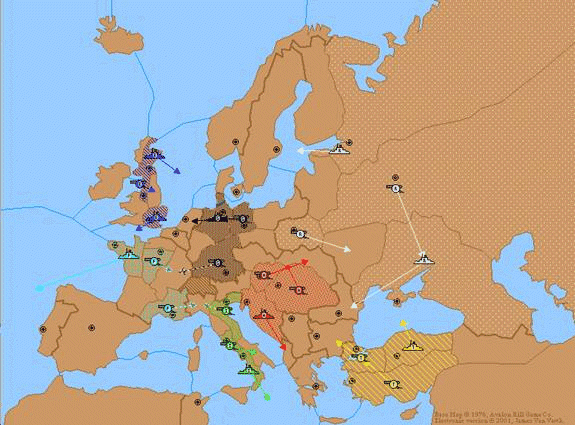


The idea to run a demonstration game came to me late one night when a very simple question was posed to a Diplomacy list: "How can I take my solid midgame position and drive it toward a solo?" Simple question? Probably about as complex a question that arises in Diplomacy, and if I had a good answer I probably would be retired in Cancun as First King of the Diplomacy Circuit.
Of course I didn't have a good answer, but I knew this was a question on many people's minds. To try to answer it, or at least be somewhat instructive along the way, I went for a "watch and learn" approach; pull together 7 players, a couple of "expert" commentators, and as many observers as possible. The idea was simple: let the 7 players play and comment to the group as appropriate on the rationale behind their actions. Let the experts and peanut gallery analyze the situation, offer words of wisdom, and stand on as many soap boxes as they wanted. The more diverse the opinions the better.
In this article I try to summarize some of the interesting aspects of the game and point out some of the lessons that might be taken home from it. I will apologize in advance for the pedantic tone of this article and the unending number of rhetorical (and non-rhetorical) questions I will pose.
I'll stop for a moment and give the conclusions. After all we've got short attention spans. So here goes, lessons learned.
Some good points, right? No doubt if you've been playing for more than one day you've heard at least some of them before. But I guess in my summary I didn't answer the question I was originally posed. Alas, this game did not reveal any straightforward answer. But it did offer some interesting insights. I guess you'll have to read on if you want to know…
To protect the (not-so) innocent, I'm not going to give out any of the players' names (see, I've lied to you already, and we've only just begun). Let's just say it was a fine mix of FTF and e-mail players of intermediate to very strong skill levels. Early assessment (read, pre-Spring 1901) by the experts was that the Turkish player had the best solo chances. Well, the NFL commentators predicted the Saints to make the Super Bowl and we see how well that's going. On the other hand, maybe the Diplomacy prognosticators were on to something. The Russian player seemed a bit overwhelmed by the competition, while the Austrian player was, shall we say, not as communicative as his neighbors might have hoped. The Italian and the three western powers were all very strong players albeit with drastically distinct playing styles (and we shall come back to that).
Let us now take a look at Spring 1901, which in most games speaks very little, but here I think it foreshadowed a great deal.

Wow. When was the last time you saw THAT? Stop reading a moment and see if you can figure out (1) why this happened and (2) where this is leading.
Ready? Okay. Let's start with the west. Everyone ganging up on France? Put yourself in France's shoes. Let's say you know its coming. How do you move?
Wait a sec. How do you know its coming? Presumably EGI are smarter than to leak it. But then why move this way as France? Lucky guess?
Now the east. Was Bud S Vie-Gal a good move? You certainly don't see it often. What about Russia's moves? Looks pretty anti-Turkey. And what about Turkey's opening? Black Sea but not Armenia. Are two builds in store?
Okay. So let's figure out what we can actually learn about this Spring 1901 turn. I'll take it country-by-country:
Well, that's the sort of analysis made every single turn in this game. But I'm not going to repeat it in this article, because that's boring and you should have just watched the game if you wanted that. So let's just fast forward a couple of years to Spring 1905.
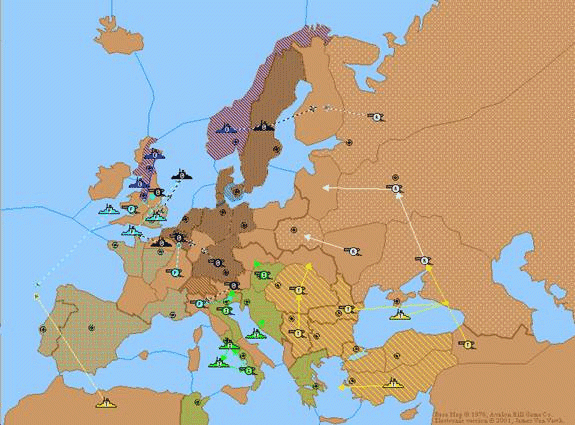
Hoo-ah! Austria's already gone, thanks to Italy and Turkey, and perhaps more surprising, Russia is down to his home centers, and not long for that. France is into England yet Germany is pushing into France (and Tyrolia?!). And the biggest development is a bit more subtle. It's the IT alliance that ran through Austria and is now starting to push the center.
Why is IT doing so well? A couple of reasons:
IT marches, but will it last? Will the west get their acts together? Let's take a short hop forward to Winter 1905, a key build turn. Germany gets two builds by virtue of having to pop the army that had been in Tyrolia, and getting dislodged from Munich by France and going off the board. So let's have a peek:
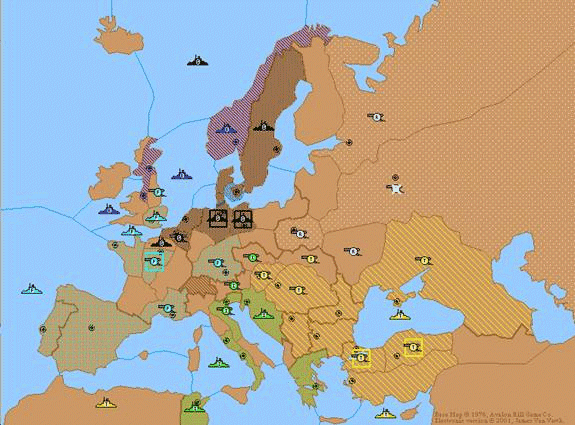
Two fleets for Germany! Good choice or bad? Certainly an interesting one. France, England, and Germany now have a total of 16 centers between them which support 11 fleets and 5 armies (note Germany has 5 fleets and just one army). Russia, for all intents and purposes, has become a dot farm for Turkey. And IT is pushing the major stalemate line (remember stalemate lines?).
Now, pretend for a moment that you're playing Turkey. Or Italy. Given the present position, German builds included, are you more or less likely to continue your IT alliance than if, say, Germany had built 2 armies? Now pretend for a moment you're playing France or England. How do you react to the current position?
If you predict that IT continues to roll and that EF decide Germany has long outlived his usefulness, you're right. Let's take another quick peak in evaluating our powers:
Fast forward to Fall 1910.

Now, by some strange change the west still holds Munich. And by some other strange change EFG are finally all working together to try to stop IT. Now its time to pause again. Big questions right now:
Let's try to answer the questions in a totally different order from which they were asked. Turkey appears to have the upper hand in the IT alliance, but is actually still pretty far from a solo. So is Italy. So a stab for the solo at this point by either part probably doesn't make a lot of sense. Thus, if you're in the west any sort of �stab� probably should be seen as feigned.
Next, what can EFG possibly do? They are down to 14 centers. Iberia, Marseilles, and Munich are lost. Soon the position is likely to be such that even MAO cannot hold. The stalemate line is broken: it's all over!
Or maybe not. Maybe you remember some of the smaller stalemate lines. Like the 14 center line that holds just the dots EFGR have here, even with a loss of MAO. Maybe even with a loss of Gascony. Do you see it? Obviously the fact that we only have 5 EFG armies and France is going to be due retreats is going to make positioning for this line very difficult. But it's quite achievable.
Do they do it? Fast forward to Spring 1913:
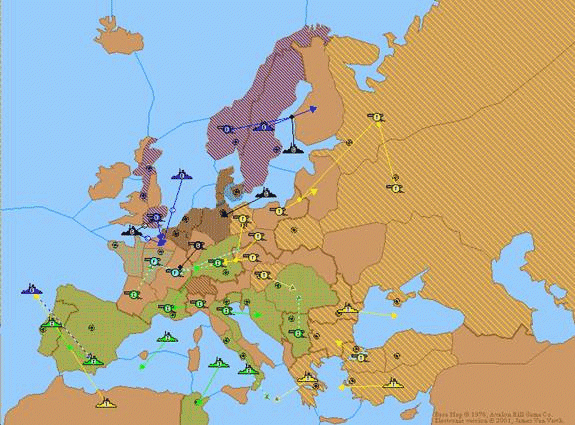
Nope. Missed opportunities. Now look again carefully. Is there some smaller stalemate line that EFG can hold? Something with 9 or 10 centers maybe?
Alas the answer is no, which means this game can only have a few outcomes. A Turkish solo. An Italian solo. A DIPLOMATIC draw. And I say a "diplomatic" draw because there is no longer any possibility for a real tactical draw. Why would there be a diplomatic draw? Why wouldn't Italy or Turkey rush to beat the other for a solo?
Let's look at the final position and see how it turned out. Fast forward to Fall 1919.
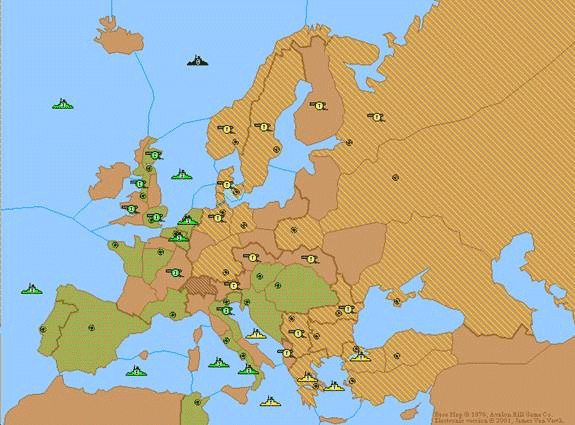
Game over, IT 2-way draw. A very rude, distasteful outcome to many. Including the majority of our expert commentators. Why is it distasteful and more importantly why did it happen?
The answer to the former question is easier. Many players, expert and not, believe that when a solo is available it should be, MUST be, taken. Period. I have no problem with this philosophy. However, to believe that ALL players share in it is simply foolhardy.
As I've said repeatedly, Italy and Turkey were both played by expert players. Once the western powers failed to hold the 14-center stalemate line, the game was a solo for Turkey if he wanted it. Once Turkey decided to play in such a way to get a 2-way draw with Italy, there became the possibility of an Italian solo. But it came down to something very simple - Turkey decided he did not want a solo. Italy decided he did not want to solo.
The western powers, assuming that either of them would go for a solo if it were available, tried to break them apart by threatening to throw the game one way or the other. Obviously such a strategy is much less effective when neither power really cares!
In conclusion, I'd like to step back a bit and thinking about the original question that was posed that led to formation of this game: "How can I take my solid midgame position and drive it toward a solo?" I guess I didn't really answer it. The game didn't end as a solo, but it could have. And what were the critical factors that would have driven it there? Three things: Timing, timing, and timing!!! But I'll let a more qualified expert write the treatise on that subject.
So there you have it. The anatomy of a demo game, with most of the meat and guts left out. If you're interested in learning more, all of the commentary, turn results, and press can be found on the yahoo group Prometheus-dip. The material will hopefully be posted in the Showcase section of the Pouch soon.
 |
Adam Silverman ([email protected]) |
If you wish to e-mail feedback on this article to the author, and clicking on the envelope above does not work for you, feel free to use the "Dear DP..." mail interface.

